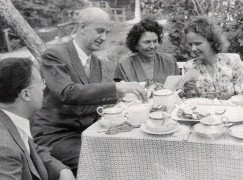Did Furtwängler change at all after Hitler died?
mainFrom a Wall Street Journal book review by Joe Horowitz:
A much more compelling section of Mr. Allen’s narrative comes at the end, when he observes that Furtwängler blithely maintained his musical ideology after World War II, with no evident pause for reflection. One can agree that this says something unpleasant about the Furtwängler persona, suggesting a nearly atavistic truculence. But it is reductionist to analogize Furtwängler’s unrelenting postwar hostility to nontonal music to “the non-rational censure of ‘degenerate’ art by the Nazis.” Far more interesting is Furtwängler’s own argument that the nontonal music of Arnold Schoenberg and his followers lacks an “overview.” A calibrated long-range trajectory of musical thought was an essential ingredient of Furtwängler’s interpretive art. Absent the tension-and-release dynamic of tonal harmony, he had little to work with.
This is an intriguing line of thought: did modernism make maestro interpretation redundant?
Discuss.
Full review here.






Comments